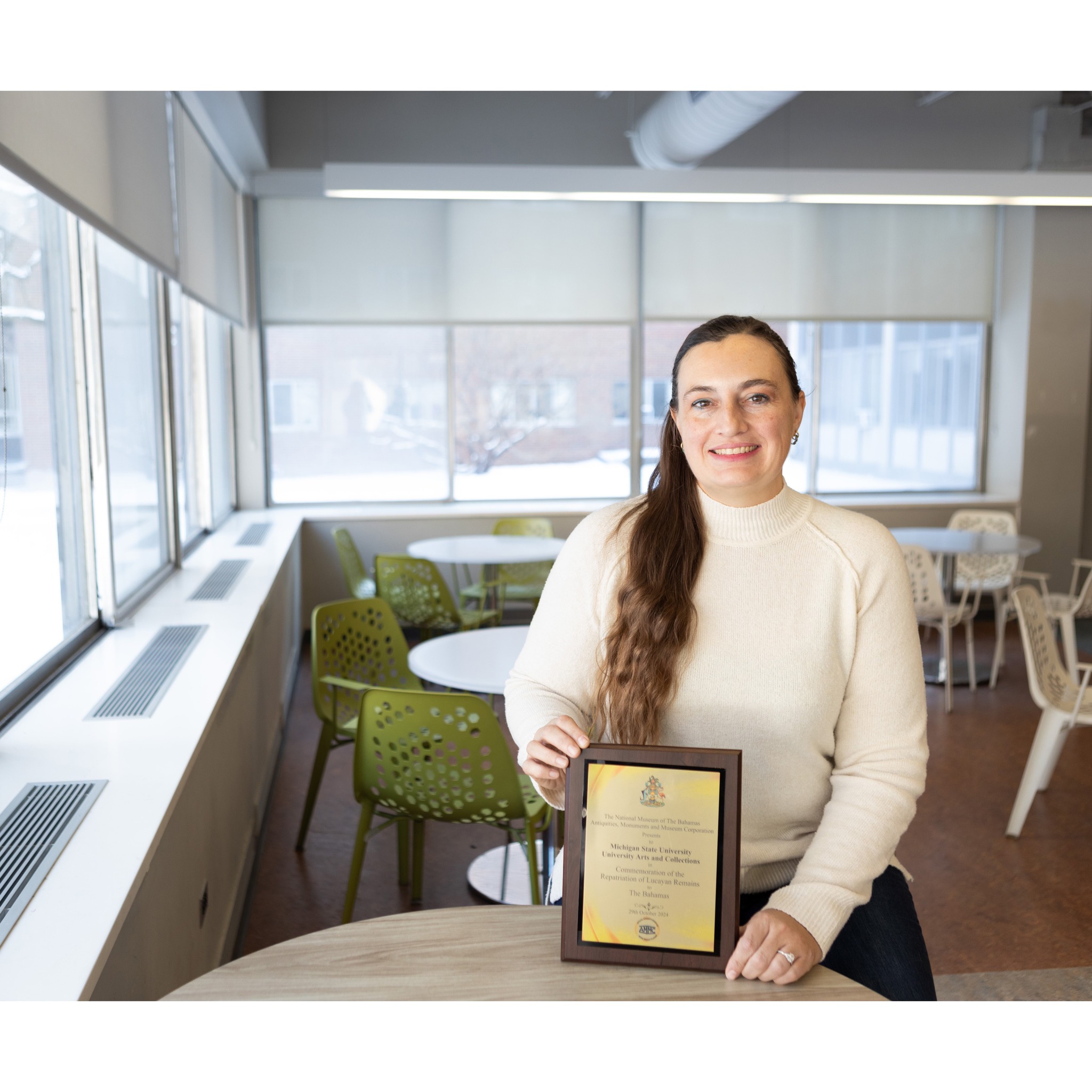MSU completes first-ever repatriation to The Bahamas
December 20, 2024 - Louise Henderson

Dr. Jessica Yann believes everyone should have a right to their own history.
Yann, Program Manager for Michigan State University’s Native American Graves Protection and Repatriation Act (NAGPRA) program and a faculty member in the Department of Anthropology, completed the first-ever human Ancestral remains repatriation to The Bahamas.
“To see how important this return was to the people of The Bahamas, to know that their cultural heritage is back where it belongs, and that I was a part of it, is incredibly humbling,” Yann said. “I’m glad to have been able to facilitate it.”
While reviewing a collection donated by the Chamberlain Memorial Museum in the 1950s, Yann discovered human ancestral remains from The Bahamas. As with most collections, Yann knew the provenance of the items, but how they were originally acquired remained unclear. Although NAGPRA applies only within the U.S., Yann applied its principles to help initiate the return of Ancestral remains to The Bahamas.
After several phone calls, Yann connected with Dr. Grace Turner, senior archaeologist at the Antiquities, Monuments, and Museums Corporation (AMMC) in Nassau, to facilitate the return.
On Oct. 28, 2024, Yann was welcomed to The Bahamas by Prime Minister Philip Davis and completed the repatriation of the ancestral remains. During her three-day visit, she witnessed the island community celebrate the return, displaying the remains in the country’s Parliament building and opening them for public viewing.
“It’s a moment where part of our past, held far from our shores for nearly a century, has finally returned home,” Davis said in his address. “Thanks to this collaboration between Michigan State University’s Arts and Collections Department and our own Antiquities, Monuments and Museums Corporation, we mark a historic first for The Bahamas: the return of ancestral remains from an international institution.”
Yann noted that Caribbean islands have been looted for centuries, and the AMMC has worked hard to track their collections. This particular one was previously unknown to them, now providing access to new information about their history.
“They don’t have a lot of good data on the Lucayan people, the island’s indigenous inhabitants, and these were Lucayan remains, which added to their understanding of the first people to inhabit the island,” Yann said.
A key component of Yann’s role is auditing collections to identify items eligible for repatriation under NAGPRA. According to nagpra.msu.edu, NAGPRA is a U.S. federal law passed in 1990 that requires institutions receiving federal funding to inventory their collections, consult with federally recognized Native American and Native Hawaiian tribes, and repatriate human remains and associated funerary objects, unassociated funerary objects, sacred objects, and objects of cultural patrimony to those with a legal right to them.
By auditing these collections, Yann can trace how these items were acquired, even before they reached MSU’s campus. If an item is found to be NAGPRA-eligible and was not obtained with permission, Yann works with Tribes to complete the repatriation process.
“If there was no consent for a collection to be removed from its original location, we either need to get consent to keep it or return it,” Yann said. “We are recognizing that archaeologists aren’t the sole authority on the past — many people should have a say in how the past is understood.”
Yann explained that individuals working with NAGPRA agree that Tribal items should be repatriated to their communities of origin. This was not always the prevailing view.
“We’ve seen a shift in archaeological practice to treat these Ancestral remains as people who should be returned to the appropriate communities,” Yann said. “NAGPRA and doing this work continues to be important because it’s about social justice, human rights, and correcting the wrongs of the past.”
Yann hopes this return to The Bahamas will inspire others to review their collections and follow suit.
“We need to put cultural heritage back into the hands of the descendants of the people who created it. They have a right to it,” Yann said. “By hoarding someone else’s history, we make it inaccessible to them, and by gatekeeping their history, we perpetuate colonial injustices.”
Yann is passionate about this work because she believes in reconciling the wrongs of the past. Through communication with Native American Tribes and other Indigenous communities worldwide, Yann continues to learn and seek guidance on handling culturally sensitive items.
“There’s a lot of space for collaboration, engagement, and improving our collections management by having these conversations,” she said. “Michigan State University will do everything we can to ensure that those who created cultural heritage have access to it and the right to it.”

